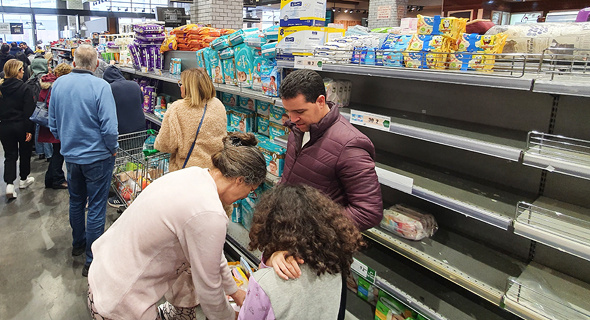Coronavirus
Coronavirus Panic Leads to 18% Jump in Israeli Food Sales—In One Week
Canned foods, rice, and pasta have seen the sharpest increases in demand as Israelis storm the shelves
13:4017.03.20
The first week of March has seen a 17.9% jump in consumer products sales in Israel compared to the same week last year, according to information services provider StoreNext Ltd. This follows a 3.1% increase year-over-year in the last week of February.
 Empty supermarket shelves. Photo: Dana Koppel Over the weekend, Israeli retailers benefited yet
again from the crowds descending on the stores. Tiv Ta'am, a local 24/7 supermarket chain, saw 2.5 times the normal amount of customers, with each shopper buying 157% more on average. Supermarket chain Victory reported sales 1.5 times higher than average on Friday. According to Automated Bank Services Ltd., a central credit card clearance and communications network company working in Israel, Israelis spent NIS 22.2 billion (approximately $5.86 billion) over the past weekend using credit cards at stores, a 1.4% increase in activity compared to the weekend before. Credit card usage for online shopping jumped by 5.3%, or NIS 849 million (approximately $224 million), from the previous weekend.
Empty supermarket shelves. Photo: Dana Koppel Over the weekend, Israeli retailers benefited yet
again from the crowds descending on the stores. Tiv Ta'am, a local 24/7 supermarket chain, saw 2.5 times the normal amount of customers, with each shopper buying 157% more on average. Supermarket chain Victory reported sales 1.5 times higher than average on Friday. According to Automated Bank Services Ltd., a central credit card clearance and communications network company working in Israel, Israelis spent NIS 22.2 billion (approximately $5.86 billion) over the past weekend using credit cards at stores, a 1.4% increase in activity compared to the weekend before. Credit card usage for online shopping jumped by 5.3%, or NIS 849 million (approximately $224 million), from the previous weekend.
Per category, the sharpest jump, 30%, was recorded for canned goods, rice, pasta, and prepared foods. A 24% jump was seen for paper goods, oils, cleaning products, and cooking and baking aids. Sauces, spreads, hygiene products, and frozen vegetables increased by 19%. The hand sanitization category grew in terms of product stock by 28.8% year-over-year, and its sales since the start of 2020 have surpassed total sales for 2019.
 Empty supermarket shelves. Photo: Dana Koppel
Empty supermarket shelves. Photo: Dana Koppel Related stories:
- Over a Third of Israeli Tech Companies Consider Layoffs due to Coronavirus
- From Feast to Famine: a Glimmer of Hope on the Way to the Bottom
- Corona Is Slowing Down, Humanity Will Survive, Says Biophysicist Michael Levitt
Despite the panic, Israel is not expected to suffer food shortages. The government estimates the national food stockpile is expected to see the country through an entire year, the Ministry of Economy told Calcalist in response to a query. The stockpile, which does not include stock held by manufacturers, is managed by the ministry and includes products such as flour, oil, salt, rice, yeast, canned tuna, pasta, and baby formula. The ministry is in daily contact with food manufacturers to keep tabs on everything, it said.
The location of the national stockpile warehouses is classified, and they will only be opened if regular supply is interrupted, a scenario the government currently estimates is unlikely.



